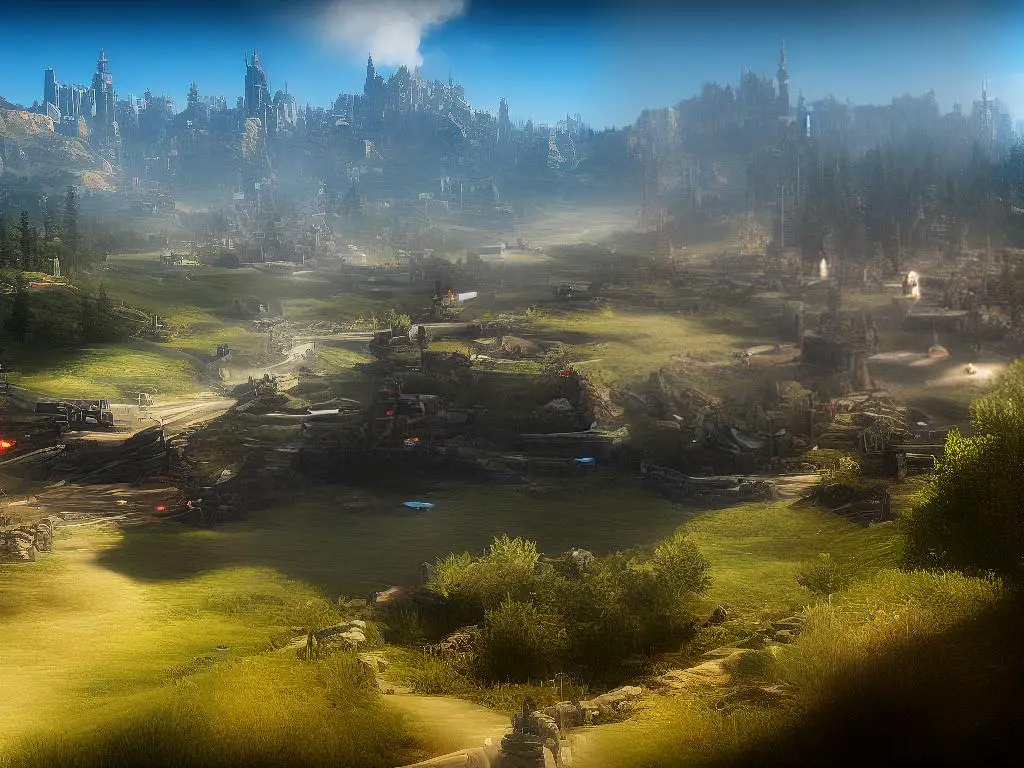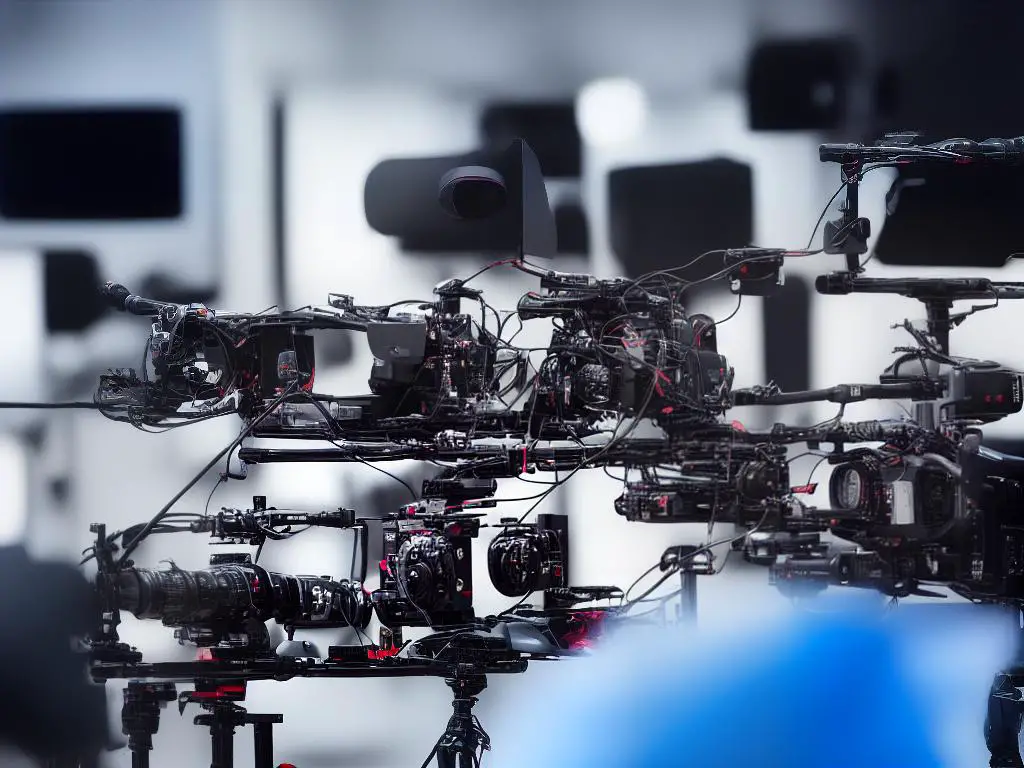The fusion of artificial intelligence (AI) and entertainment is reshaping the way we consume and create various forms of media. AI in Entertainment is here.
From AI-generated content and smart recommendations to cutting-edge applications in video games, film, and television, this dynamic intersection has much to uncover.
AI-generated Content in Entertainment Industry
Table of Contents
- 1 AI-generated Content in Entertainment Industry
- 2 The impact of AI-generated content could be tremendous, restructuring the entire landscape of the entertainment industry.
- 3 As AI-generated content continually evolves and improves, it raises critical discussions around artistic ownership and copyright, redefining the boundaries between human and machine creativity.
- 4 Smart Content Recommendation
- 5 Utilizing Data to Personalize Recommendations
- 6 Machine Learning for Personalized Content Recommendations
- 7 AI in Video Games
- 8 Virtual Reality and AI
- 9 Exploring AI and VR in the Entertainment Industry
- 10 AI in Film and Television Production
- 11 Visual Effects (VFX) Creation with AI
- 12 Automated Editing with AI
- 13 Ethical Concerns and the Future of AI in Entertainment
In recent years, the entertainment industry has seen a surge in the application of artificial intelligence technologies for generating various forms of content.
This includes the creation of original music, videos, and artworks, as AI-powered tools and algorithms have become increasingly accessible and sophisticated. AI-generated content utilizes machine learning algorithms to analyze existing artistic works, unravel the underlying patterns and principles, and synthesize new, unique pieces based on its acquired understanding. This process has the potential to revolutionize the way creative content is produced, consumed, and monetized across the entertainment sector.
The impact of AI-generated content could be tremendous, restructuring the entire landscape of the entertainment industry.
For instance, AI technologies can help musicians experiment with new musical styles by analyzing past works, generate recommendations to optimize production and marketing strategies, or even compose entirely new pieces autonomously.
Similarly, filmmakers can now leverage AI-driven techniques to create realistic visual effects, simulate natural behaviors in virtual characters, or even help write compelling screenplays by analyzing dialogues and plotlines from successful films. Even in the realm of visual art, AI-generated pieces are gaining recognition, with some fetching significant sums at prestigious auctions.
As AI-generated content continually evolves and improves, it raises critical discussions around artistic ownership and copyright, redefining the boundaries between human and machine creativity.
The exploration of AI’s creative potential also uncovers new opportunities for collaboration between human artists and machines. These partnerships might yield forms of entertainment never before imagined, revolutionizing the way audiences experience art and entertainment.
As we dive deeper into the world of AI-generated content, it is essential to carefully consider its impact to ensure a balance between innovation and the protection of creative integrity in the entertainment industry.
Smart Content Recommendation
Smart Content Recommendation through AI
One significant aspect of AI in the entertainment industry is smart content recommendation. Utilizing AI algorithms to analyze user preferences, interests, and behavioral patterns, platforms can provide highly personalized content suggestions that ultimately enhance user engagement and satisfaction.
This not only keeps users returning to these platforms for more content but also allows for a more immersive and tailored entertainment experience.
Connecting the potential of AI-generated content and smart content recommendation paves the way for a revolutionary fusion between human creativity and machine intelligence, creating a breed of new and immersive experiences in the world of entertainment.
Utilizing Data to Personalize Recommendations
To achieve a high level of personalization, AI-powered recommendation systems gather data from multiple sources, such as browsing history, genre preferences, previously watched content, ratings, and user location.
By processing and interpreting this vast amount of information, AI algorithms can then predict what a user is most likely to enjoy, providing them with targeted recommendations that match their tastes. Furthermore, automated content recommendations encourage the discovery of new content, bridging the gap between users and previously undiscovered films, TV shows, or music that they might find compelling.
Machine Learning for Personalized Content Recommendations
Machine learning is transforming the entertainment industry by powering content recommendation engines that offer personalized viewing experiences to users. As consumers engage with a platform and provide feedback through likes, shares, and watch time statistics, AI algorithms learn and adapt to deliver tailored selections that refine the overall user experience.
This continuous evolution of AI-driven content curation has proven highly effective in maintaining user engagement while helping content creators and distributors generate more revenue through increased consumption and targeted advertising investments.
AI in Video Games
AI’s Role in Enhancing Video Game Experiences
The integration of artificial intelligence into the video game development process has revolutionized the gaming experience by offering realistic, dynamic, and engaging gameplay scenarios. For instance, AI has played a significant role in the evolution of interactive storytelling. By analyzing player behavior, AI algorithms can adapt a game’s narrative to suit individual playstyles, creating personalized storylines that cater to each player’s interests and preferences. This not only keeps gamers invested in the game but also delivers unique, immersive experiences that make stories more meaningful and memorable.
Procedural Content Generation
Another groundbreaking aspect of AI integration in video games is the procedural content generation. This feature enables the automated creation of game assets, such as levels, missions, and environments, driven by algorithms. As a result, developers can save time and resources while offering players an extensive and diverse playing field.
By tailoring the generated assets to individual players’ preferences and skills, the game maintains a balance between challenge and engagement, ensuring a satisfying and enjoyable gaming experience.
Artificial Intelligence and Non-Player Characters
Developing lifelike non-player characters (NPCs) is a vital aspect of contemporary game design that greatly benefits from the implementation of artificial intelligence (AI). AI-powered characters can display human-like behavior, emotions, and decision-making abilities through advanced programming techniques such as machine learning and natural language processing.
This results in NPCs that can react intelligently and dynamically to various in-game situations, as well as to player choices and actions.
As a consequence, a more immersive and interactive gaming environment is created, allowing players to feel more connected to the storyline and the game world. As developers continue to innovate and leverage advancements in AI technology, its potential to revolutionize the entertainment industry only grows.

Virtual Reality and AI
VR and AI in Gaming: A Seamless Integration
The combination of virtual reality (VR) and artificial intelligence (AI) has transformed gaming into a more interactive and immersive experience. Building on the advancements of AI in developing lifelike NPCs, AI integration further allows games to feature realistic characters that respond to players’ actions in real-time, adapt their behaviors, and even learn from experience.
Additionally, AI-driven content creation tools enable developers to design diverse environments with increased speed and efficiency. As both AI and VR technologies continue to evolve, the future of gaming holds immense potential for offering gamers a truly engaging and realistic experience.
VR and AI in Film and Television
Through CGI and advanced machine learning algorithms, virtual reality is creating lifelike representations of human actors and environments that mimic reality. AI-generated characters that have nuanced facial expressions and body language.
Additionally, AI-powered speech synthesis creates authentic dialogue contextual to the scene. These technologies have the potential to revolutionize storytelling and create entirely new forms of entertainment.
Exploring AI and VR in the Entertainment Industry
Both Virtual Reality (VR) and Artificial Intelligence (AI) have been making significant impacts in the entertainment industry, creating immersive experiences and innovative content. However, their potential extends beyond entertainment and into other fields such as education, mental health, and historical recreation.
AI-powered VR scenarios can simulate real-life situations, tailoring environments to individual users’ needs while taking ethical concerns such as deepfake content and potential addiction into account.

AI in Film and Television Production
Incorporating AI in Script Analysis and Development
Integrating Artificial Intelligence into the creative process has shown promise, particularly in script analysis. AI algorithms can assist producers and writers in identifying key elements within a screenplay, including potential plot holes, character development, pacing, and audience engagement.
With access to large databases of successful scripts, AI can offer suggestions for improvements, predict a script’s success, and even generate new ideas to enhance a story’s impact. This data-driven approach not only makes the creative process more efficient but also adds an objectivity that benefits all aspects of entertainment production.
Visual Effects (VFX) Creation with AI
Around VFX creation, AI is making great strides. Machine learning algorithms can now generate realistic visual effects with greater efficiency and accuracy than traditional VFX methods.
By using Deep learning techniques such as generative adversarial networks (GANs), incredibly lifelike characters, objects, and environments are created. This reduces the time and manpower required for these tasks.
AI-powered VFX software can also assist in cleaning up video footage, automating rotoscoping, and refining 3D models, allowing filmmakers to achieve their desired visual outcomes with greater precision and control.
Automated Editing with AI
AI-powered editing software in the entertainment industry can swiftly analyze and organize hours of raw footage, enabling editors to easily select the best shots and construct a coherent narrative.
AI algorithms can analyze audiovisual patterns, understand narrative structures, and even predict audience preferences, optimizing the editing process for maximum viewer engagement.
This streamlines the post-production phase, freeing up time and resources for other essential aspects of filmmaking and storytelling.

Ethical Concerns and the Future of AI in Entertainment
The Ethics of AI in Entertainment
As AI makes significant strides in the entertainment industry, particularly in areas like automated editing, various ethical concerns have come to the forefront. These issues include the impact on creativity, potential job displacement, and concerns about data privacy.
It is essential to carefully examine and address these ethical considerations as AI continues to shape the future of the entertainment sector.
Ownership of AI-generated Content
As algorithms begin to compete with human-generated content, the question of ownership over creative outputs comes into question. While AI-generated music and art is increasing in popularity, concerns loom over whether these creations are as valuable as those made by human artists.
Additionally, the widespread use of AI-generated content may undervalue the role of human input and further blur the line between plagiarism and inspiration.
Job Displacement because of AI in Entertainment Industry
Another key ethical concern is job displacement, as the increased use of AI in entertainment threatens to crowd out human workers in various roles. Traditional positions in content creation, such as writers, designers, and composers, are at risk of being replaced by AI tools capable of generating a vast amount of creative content in lesser time.
Although AI can drive cost savings and efficiencies for the entertainment industry, the potential unemployment of creative professionals necessitates a balance between embracing technological innovation and preserving the human touch.
Data Privacy
Lastly, data privacy has emerged as a prominent ethical issue in the intersection of AI and entertainment. As AI-driven systems collect large volumes of user data to improve content recommendations and personalization, concerns arise over potential misuse or unauthorized access to personal information.
Consequently, the industry must work diligently to protect user privacy and establish responsible data handling practices. Moreover, content creators utilizing AI should be transparent about their use of the technology and the parameters guiding their AI-driven creations, to ensure consumers have the autonomy to make informed choices about the content they consume.
As the entertainment industry embraces these AI-driven technologies, it is imperative to address the ethical concerns that arise, such as creativity, job displacement, and data privacy. The potential advancements and opportunities within this domain are limitless, paving the way for a future where technology and entertainment merge to provide unparalleled experiences for all.

I’m Dave, a passionate advocate and follower of all things AI. I am captivated by the marvels of artificial intelligence and how it continues to revolutionize our world every single day.
My fascination extends across the entire AI spectrum, but I have a special place in my heart for AgentGPT and AutoGPT. I am consistently amazed by the power and versatility of these tools, and I believe they hold the key to transforming how we interact with information and each other.
As I continue my journey in the vast world of AI, I look forward to exploring the ever-evolving capabilities of these technologies and sharing my insights and learnings with all of you. So let’s dive deep into the realm of AI together, and discover the limitless possibilities it offers!
Interests: Artificial Intelligence, AgentGPT, AutoGPT, Machine Learning, Natural Language Processing, Deep Learning, Conversational AI.

